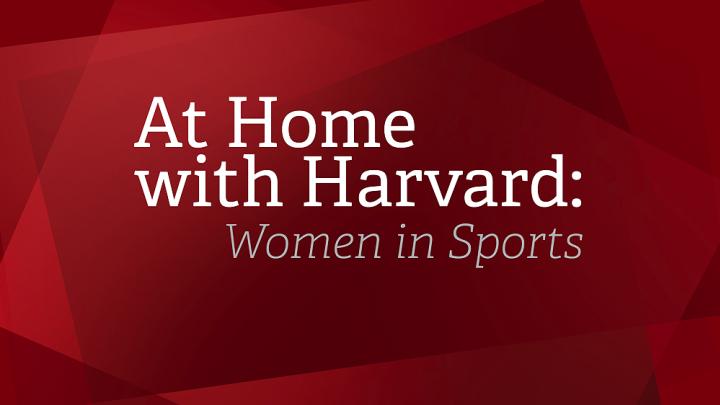This round-up is part of Harvard Magazine’s series “At Home with Harvard,” a guide to what to read, watch, listen to, and do while social distancing. Read the previous selections, featuring articles about climate change, racial justice, movies and theater, and more, here.
Women are a force of nature—in life, and in sports. Harvard has been home to many women athletes who have raised the bar in their sports entirely. This week, we've compiled our favorite stories about them and their successes, challenges, and hopes.
Linda Liedel, from a young age, had her share of doubters. As a young girl playing on an all-boy team, she was the subject of taunts from parents on the sidelines. As she grew older, frequent injuries had coaches and doctors questioning her future in the sport. Liedel fought through the criticism, becoming a standout on Harvard’s soccer team and representing Germany in international competition. Though she suffered some injury setbacks in 2019, I’ve learned that it’s never wise to doubt Linda Liedel.
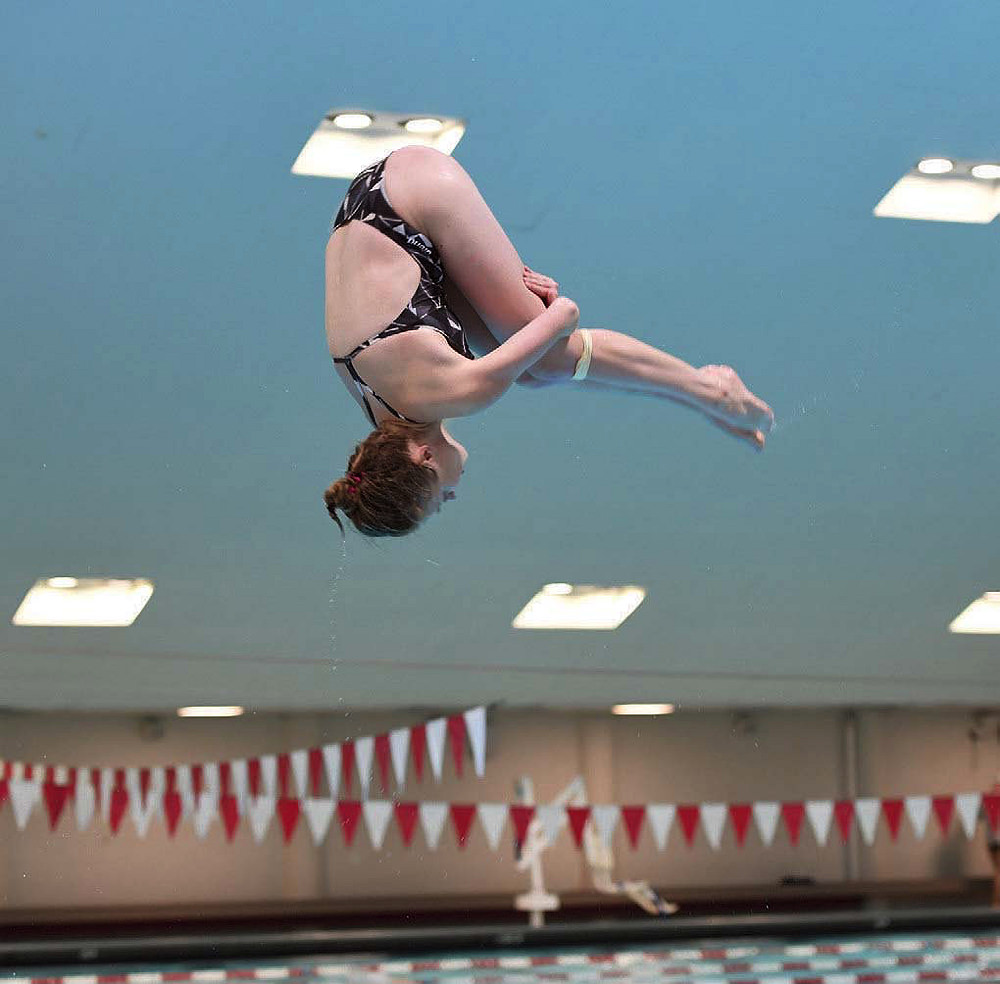
Georgina Milne tucks and flips, helping Harvard defeat Brown.
Photograph courtesy of Harvard Athletic Communications
All In Her Head - What do you do when you’re a diver and don’t have access to a pool? Practice at the one in your head! When the pandemic forced everyone away from campus, I wondered how top athletes were keeping up with their sports—especially sports that usually require access to a facility. Georgina Milne ’21, a star Harvard diver, explained to me how she keeps her skills sharp when away from any pool, and hundreds of miles away from Harvard’s. I found her explanation fascinating, and hope you enjoy the resulting story!
-Jacob Sweet, Staff Writer/Editor
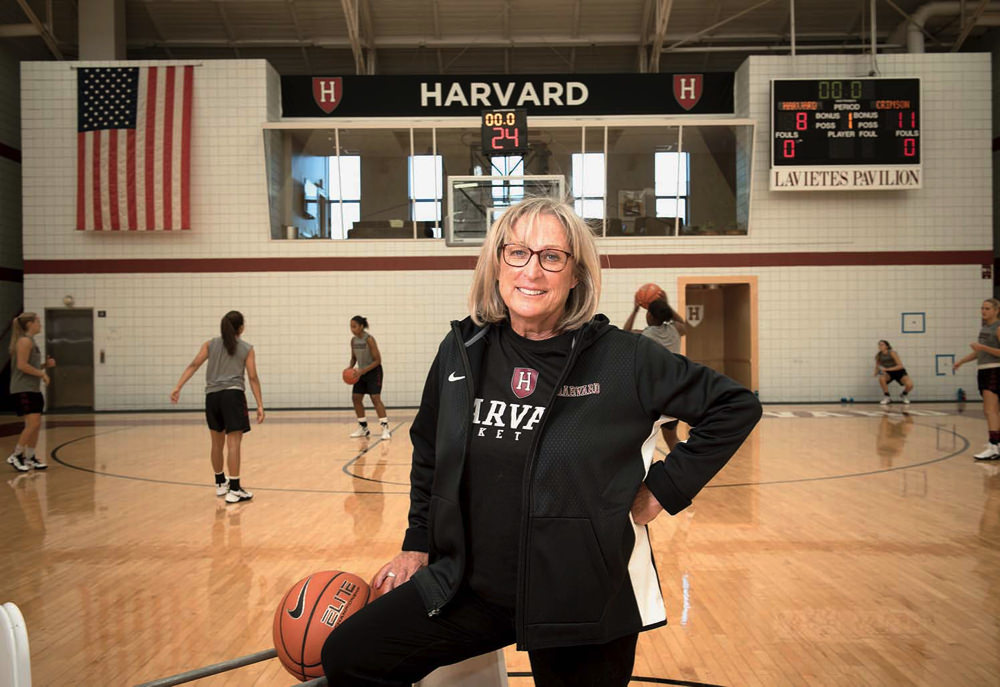
Kathy Delaney-Smith, the winningest coach in Ivy League basketball
Photograph by Stu Rosner
Harvard’s veteran women’s basketball coach—who has done this work for nearly a half-century, counting her earlier service at the high-school and higher-ed levels—is the winningest coach in Ivy League basketball history. But she is best known, to her players, as a mentor interested in their development: “Kathy has a gift for being able to synchronize a team toward a common goal,” says Rachel Garlin ’96, “but she also helps each player get in sync with who they are.” Correspondent David Tannenwald reports that fulfilling that role today “involves far bigger issues surrounding sports, gender, society, and, ultimately, how the coach and her players lead their lives.” In his earlier profile of Delaney-Smith, “‘Acting As If’ for 35 Years,’” Tannenwald recalls a signature highlight: “[S]he is the lone coach (male or female) to lead a 16-seed over a one-seed in the NCAA tournament (the Crimson’s 1998 victory over Stanford, 71-67, on the Cardinal home floor).” But he points to her consistent mantra as the source of her strength and her teams’ successes, on the court and in players’ lives: “‘act as if’ involves convincing oneself that challenges are surmountable and goals are attainable.”
In a year when the biggest collegiate football conferences appear determined to play—and to collect their multi-hundred-million-dollar broadcast fees, talk about “The Professionalization of Ivy League Sports” appears odd at first. But Craig Lambert’s analysis of the changes in youth sports (year-round play, early specialization, professional-level coaching), recruiting, and more holds true today. And in fact, the uncertain status of the “scholar-athlete” in contemporary campus life is very much under review, as Harvard’s recent review of athletics suggests. The Crimson won’t be playing during this pandemic-altered fall semester, but new athletics director Erin McDermott has plenty to think about, as Ivy peers and other elite universities have begun restructuring their sports programs.
~John Rosenberg, Editor
On the occasion of Harvard’s 375th anniversary in 2011, reflecting on the specialization afoot in Ivy League athletics, deputy editor Craig Lambert called Char Joslin ’90, M.B.A. ’95 likely “the last of the three sport Mohicans:” Joslin lettered in varsity field hockey, ice hockey, and lacrosse in all four years at the College. She was also the first female athlete in Ivy League history to earn first-team league honors in three different sports. Student athletes today typically specialize in just one sport, training and cross-training year round in order to excel in their chosen discipline—as Lambert describes in Faster, Higher, Stronger. Last and first….Joslin remains one of the greatest athletes, male or female, ever to have played at Harvard. Read also the accompanying sidebar, The Crimson Triumphant, for 25 sports highlights of the quarter-century spanning 1986-2001.
-Jonathan Shaw, Managing Editor
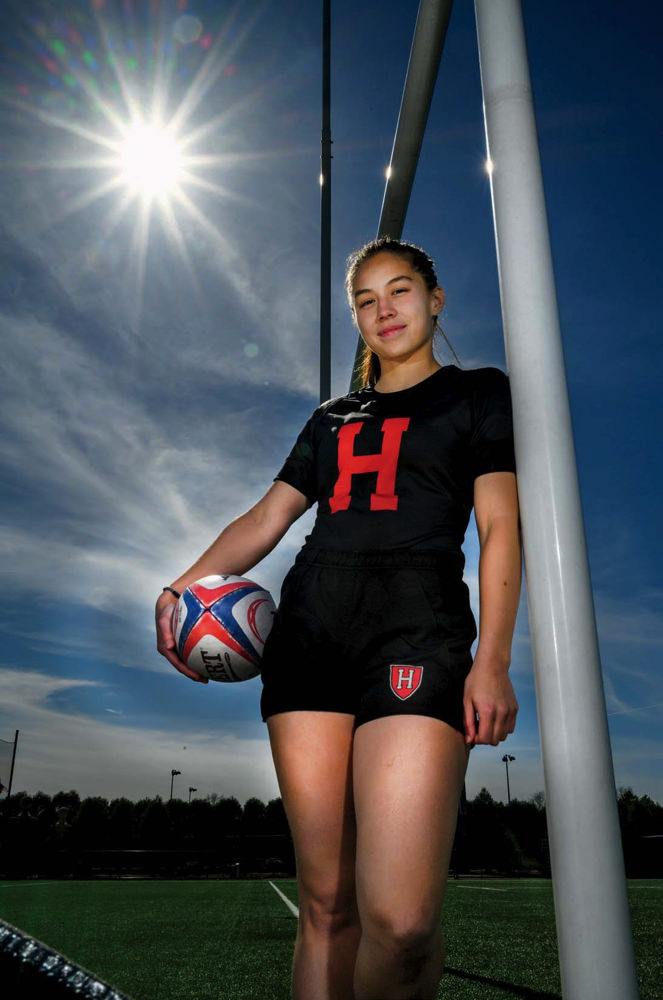
Sofie Fella
Photograph by Jim Harrison
Shanghai native Sofie Fella was always a natural athlete, but it wasn’t until high school that she found her sport, in the tackles and breakdowns and wild chasing sprints of rugby. It was so much fun to report this story on Fella, to watch her practice and compete with her teammates—she plays wing and fullback, two of the most demanding positions—and to hear her tell stories about the game she loves. (It’s also a game that occupies an important and distinctive place in the history of women’s athletics at Harvard.) With rugby, Fella told me, “it feels like the harder you work, the better you get. That relationship was so clear to me.” It’s a truth she has proved again and again on the pitch.
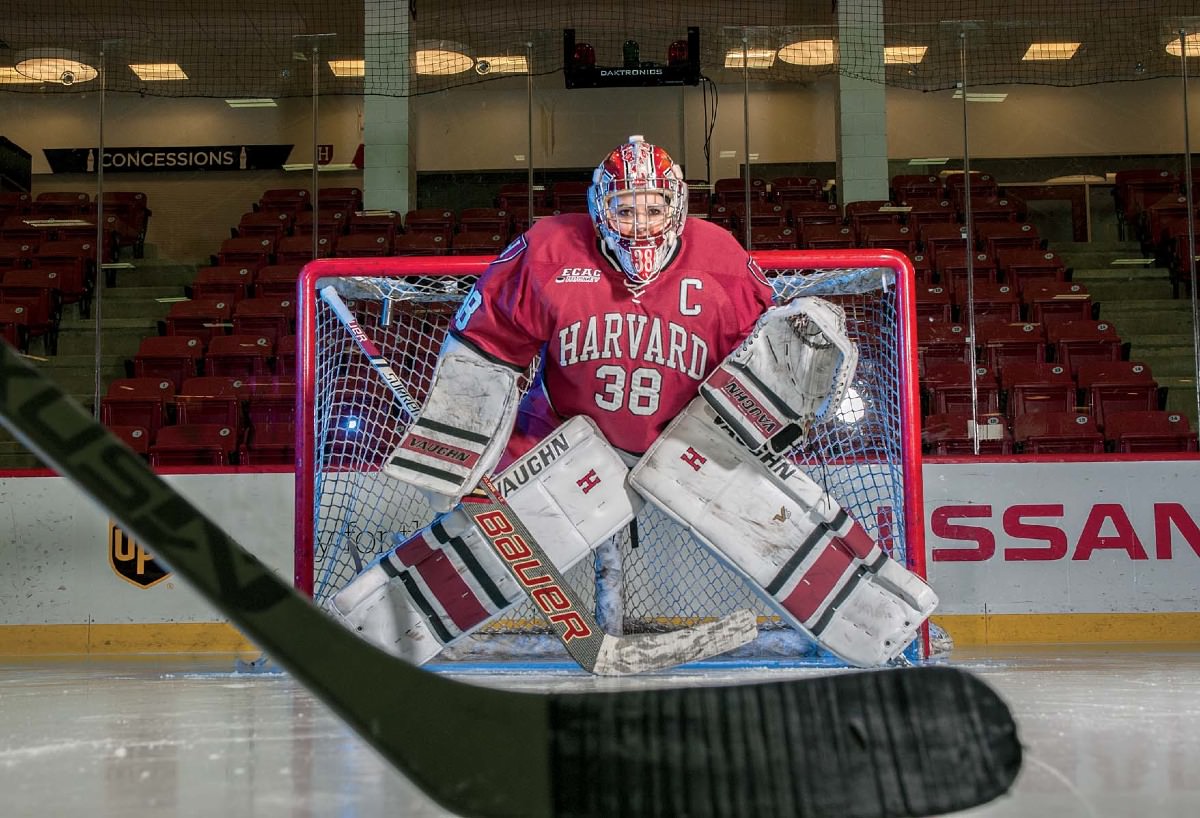
In January 2016, Maschmeyer made her 2,108th save, surpassing the Harvard women’s hockey all-time record.
Photograph by Jim Harrison
I’ve always loved goalies, especially in hockey. The split-second reflexes, the high-stakes dives, the way they keep watch over the whole ice, alone, all stillness one moment and a blur of motion the next. In 2016, I had the chance to profile one of the best goaltenders in women’s hockey—or, as her coach said at the time, in all of collegiate hockey: Emerance Maschmeyer. Now a member of the Canadian national team, Maschmeyer (or “Mash,” as her teammates called her) was then a senior co-captain of the Harvard women’s team, finishing up a final season in which she’d broken a handful of league and program records. One of five siblings—all hockey players—Maschmeyer grew up in a tiny town outside Edmonton, raised by a coach-dad who built a full-size rink every winter on the family’s 10,000-acre farm. “That’s the root of my game,” she told me. “My game was built there, with my family.”
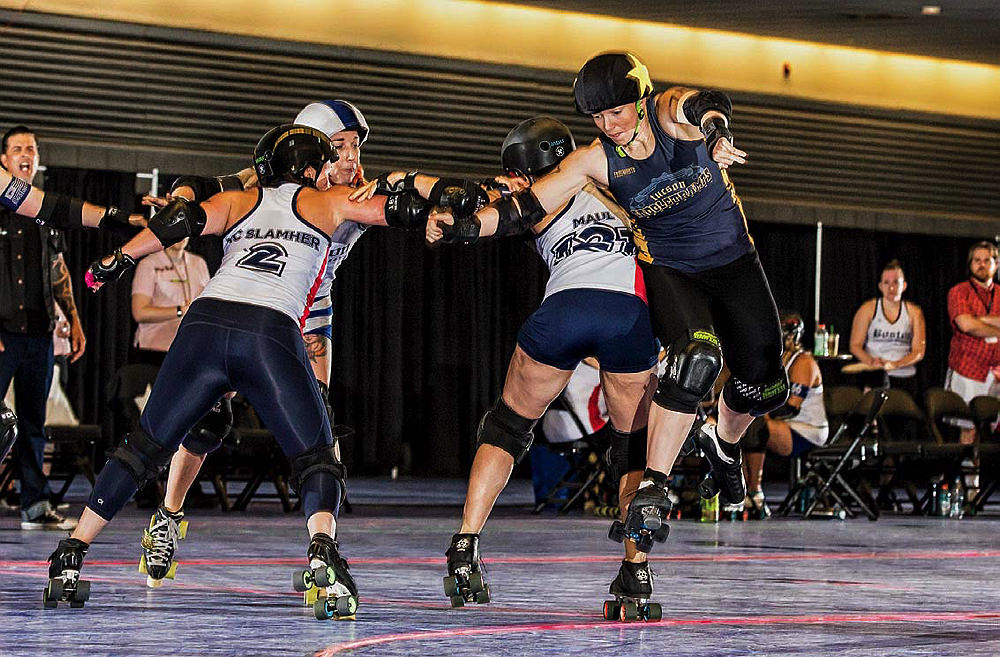
Erica Viscio, a.k.a. “Maul,” slams by opponents on the track.
Photograph by Steve Jurkovic
Campy and garish from the start, roller derby emerged in the early 2000s as something else as well: a serious competitive sport dominated by women. In 2018, Harvard Magazine writer Nell Porter Brown spoke with some of the Harvardian jammers and blockers and pivots who make up the Boston roller derby scene. “Graduate school is very stressful, and this is a sport where you can really get out your frustration,” Cristin Juda, aka “Brutyl Lithium,” told Nell in this fun, snappy story. Later, Erica “Maul” Viscio shared a common sentiment in the sport: “I thought it would be a good way to make some new friends,” she said, “and it turned into this incredible adventure that has altered the entire course of my life.”
~Lydialyle Gibson, Associate Editor
More from “At Home with Harvard”
- Spring Blooms: Your guide to accessing the Arnold Arboretum as the seasons turn in Boston
- Harvard in the Movies: Our favorite stories about Harvardians on screen
- The Literary Life: Our best stories about the practice and study of literature
- Night at the Museum: Our coverage of Harvard’s rich museums and collections
- Nature Walks: Walking, running, and biking in Greater Boston’s green spaces, even while social distancing
- Supporting Local Businesses: Our extensive coverage of local restaurants and retailers, and how you can support them during this time of crisis
- Medical Breakthroughs: Our best stories going deep into the ideas and personalities that will shape the medical care of tomorrow
- Rewriting History: From race and colonization to genetics and paleohistory, our favorite stories about the people reshaping the study of history
- The Climate Crisis: Highlights from our wide-ranging coverage of the environment
- Crimson Sports Illustrated: With 2020 winter sports ending early and the spring collegiate season wiped out almost entirely, we look back at Crimson highlights from past years.
- The Real History of Women at Harvard: Stories covering the admission of women, the Harvard-Radcliffe merger, the rise of women in the faculty ranks, Harvard’s first woman president, and more
- The Undergraduate: Our favorite student essays on the undergraduate experience
- The Secret Lives of Animals: From zoology and evolutionary science to animal-rights law to the joys of local wildlife, a selection of our favorite animal stories
- Harvard on the Small Screen: Our coverage of the creators, writers, and actors in your favorite TV shows
- Extraordinary Lives: From our “Vita” section, extraordinary profiles of authors, artists, activists, and more
- Great Legal Minds: Our favorite stories on the minds reshaping American law
- Harvard History through a New Lens: Some of our most notable stories about obscure, dark, or surprising episodes in Harvard’s history
- Health and Fitness: Our extensive coverage of Harvard’s breakthough health and wellness research
- Pride Month: Stories of Harvard's LGBTQ life, research and history
- Inequality in America: Stories of America’s extreme inequality
- The Immigrant Experience: A selection of our writing on immigration, displacement, and the global refugee crisis
- Harvard in the World: Harvard Magazine’s coverage of the University’s expanding global reach
- Theater & Broadway: Harvardians take to the stage.
- American Democracy: Our coverage of the nation's ailing democracy
- Traveling for the Story: Stories from all over the world
- Library Treasures: Our coverage of Harvard’s libraries, more relevant than ever in an online world
